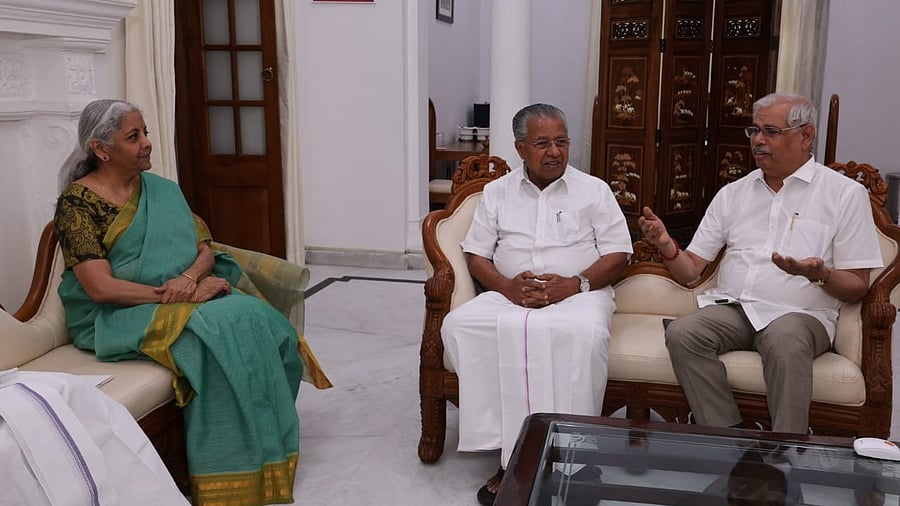
The chief minister later termed the meeting as an ‘unofficial get-together'.
Credit: X/@KeralaGovernor
On February 8, 2024, and March 12, 2025, Kerala Chief Minister Pinarayi Vijayan was in Delhi; on both occasions he was ‘engaging’ with the Union government, but in a contrasting style.
In February 2024, he was the cynosure of all political eyes as he led a demonstration against the alleged discriminatory approach of the Union government towards Kerala. Representatives from every opposition party, excluding the Congress, were present where Vijayan lashed out against the Narendra Modi government. Coming as it did on the eve of the 2024 general elections, the protest march was even seen as the Left's ability to bring all non-Congress parties on board.
Cut to March 2025. The Kerala House in New Delhi witnessed an unusual meeting where Kerala Governor Rajendra Arlekar, Vijayan, and Union Finance Minister Nirmala Sitharaman huddled together to find ways to ease Kerala’s financial crisis. The chief minister later termed the meeting as an ‘unofficial get-together'. But the ‘breakfast diplomacy’ evoked political reactions, with many commentators finding Arlekar’s presence quite unusual.
The meeting worked as the finance ministry sanctioned Kerala’s request for additional borrowing.
However, why did Vijayan, who had earlier ridiculed the governor as an agent of the ruling Bharatiya Janata Party (BJP) at the Centre, change his stand and use gubernatorial intervention to mend fences with the Union government?
Opposition in Kerala sees it as a part of the several clandestine moves that the Communist Party of India (Marxist) (CPI(M)) is taking to placate the BJP for various political and personal ends of both the party and Vijayan. According to senior Congress leader Ramesh Chennithala, the CPI(M) is initiating a secret alliance with the BJP ahead of the elections. Others alleged that the meeting was part of Vijayan’s effort to save his daughter from a financial fraud case, which is being investigated by the Serious Fraud Investigating Office (SFIO) under ministry of corporate affairs, helmed by Sitharaman
Allegations of CPI(M)-BJP bonhomie are sure to evoke strong political reactions in Kerala. Whether the allegation about Vijayan’s personal interest vis-a-vis the BJP is correct or not, there are compelling political reasons for the Kerala CPI(M) to adopt a conciliatory approach towards the BJP-led Union government.
The CPI(M), or at least a section of its leaders, think that Kerala is no more a political society that looks favourably at the idea and rhetoric of revolution. To capture the imagination of the people, this section feels, it is important to be pragmatic rather than dogmatic.
To maintain a modicum of political relevance in India, the CPI(M) has to win yet again in Kerala—and for this, the party should refurbish itself.
The importance of political pragmatism has always been there in the minds of the party leaders, right from the days of its first-ever government led by E M S Namboodiripad. This pragmatism got a boost when Vijayan became chief minister. He first successfully engaged with Rashtriya Swayamsevak Sangh (RSS) leaders to stop the political violence in Kannur, which had claimed the lives of hundreds of CPI(M) and RSS workers. The mediatory role played by spiritual leader Shri M had then stirred controversy. Vijayan, it was reported, used his proximity with Shri M, to bring the RSS leaders to the table.
Various development documents Vijayan has presented in party conferences signify the party leadership’s desperate efforts to move along the neoliberal path — a move which the CPI(M)’s national leadership continues to oppose. The party’s central leadership, after back-to-back setbacks in the parliamentary elections, is politically incapacitated to take ideological study classes for its Kerala unit.
We must view the breakfast meeting between the Marxist chief minister and the BJP central minister in this background.
The Union government’s centralising policies and lackadaisical approaches by various state governments have severely affected Kerala’s economy. The state government is forced to cut its plan fund and is finding it difficult to pay welfare pensions on time. The ‘Kerala model’ of development is in dire straits now. To address this, the Union government's co-operation is a pre-requisite.
This crisis, as Vijayan government seems to have realised, can’t be addressed by merely resorting to an anti-Delhi stand. As evident from the development document, the CPI(M) is realising that its revolutionary rhetoric is incongruous with Gen Z, while the others are fed up with the age-old tactical and political line of the party.
‘Shed your obstinate attitudes, choose pragmatism over revolutionary practices, and learn to live, and enjoy, the neoliberal ecosystem’—this seems to be what Vijayan is advocating to the CPI(M) cadre. Will Vijayan’s alliance with neoliberalism result in a winnable composition?
N K Bhoopesh is a senior journalist. X:@NKBhoopesh.
(Disclaimer: The views expressed above are the author's own. They do not necessarily reflect the views of DH).